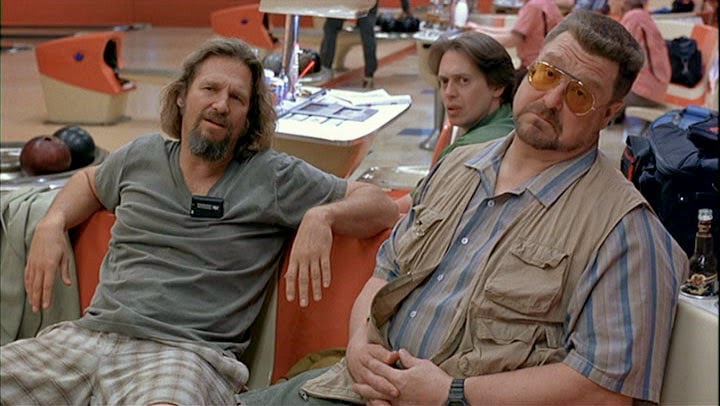 |
| I DON'T ROLL ON SHABBOS! |
How “The Big Lebowski” Taught Judaism
 |
| Jeff Bridges, Steve Buscemi, and John Goodman in "The Big Lebowski." |
“The Big Lebowski,” directed by the Coen brothers, is the ultimate stoner classic – the shaggy dog story of the Dude and his quest to seek revenge for a urinated-upon rug. It has a great cast: Jeff Bridges, Steve Buscemi (“Shut the f_____ up, Donny!”) Sam Elliott, Julianne Moore, the late Philip Seymour Hoffman, and John Turturro.
But, Jews remember the film for yet another reason – and that would be the immortal performance of John Goodman as Walter.
Walter is a Viet Nam veteran (who cannot stop mentioning the war, inviting us to realize that he might be suffering from PTSD).
Walter is a convert to Judaism who must explain why he will not participate in a bowling tournament on Saturday:
Saturday, Donny, is Shabbos, the Jewish day of rest. That means I don’t work, I don’t drive a car, I don’t f____ ing ride in a car, I don’t handle money, I don’t turn on the oven, and I sure as s_____don’t f_____ing roll…..I’m shomer Shabbos!(Walter’s second best line was the utterly incoherent non sequitur: “Etz chayim hi, Dude, as the ex used to say”).
The Coen brothers are proudly, consciously Jewish. If you don’t believe me, re-watch “A Serious Man.”
So, leave it to them to offer us one of the most profoundly Jewish characters in cinematic history.
Yes – up there with Tevye, Ari Ben Canaan in “Exodus,” Yentl – and more deeply Jewish than any character that Woody Allen has played.
So, let’s talk about Walter.
First, Walter is a convert, aka a Jew by choice.
The Coen brothers, therefore, introduced the American movie-going public to the idea that you don’t have to be born Jewish to do Jewish – and that, as American Jewish folk wisdom would have it, some of our best Jews are those who chose to join the Jewish people. Some people I love the most in the world fall into that category.
Second, Walter is a Jew who takes Jewish practice seriously – albeit in a loud and profane way.
It is remarkably rare for a figure in popular culture to proclaim any religious feeling (there are, of course, notable exceptions).
Even less common do we find a cinematic Jew, other than a noticeably Orthodox Jew, who takes Jewish observance seriously.
More than that: this is not just about lighting Shabbat candles, or attending a seder, or going to a bar mitzvah, or attending a Jewish funeral, or being married under a chuppah – all rituals that you can find in any number of movies.
Walter’s Shabbat observance is specifically one of withdrawing, temporarily, from the world – from the profane (even as he is profane) activities of the six days of creation. It is a Shabbat – not only of menucha (rest), but of kedusha (holiness).
(Now, as for not rolling on Shabbos: I will leave it to my more observant colleagues to discern whether or not this is really a violation of Shabbat. Yes, if you are paying money to the bowling alley. But rolling itself….?)
In which case, Walter has gone above and beyond the very strictures of Jewish law. Perhaps it is not about rolling a bowling ball on Shabbat. Perhaps it is about not having to compete on Shabbat – about not having to worry about personal achievement or glory, such as it might be in a bowling league.
Which brings me to my final point about Walter, and the Dude, and Donny. They are in a bowling league – and therein lies its own story.
The unheralded sweetness of “The Big Lebowski” is that, for the Dude, Donny, and Walter, their bowling team constitutes a small (eternally squabbling, but ultimately loving) family. Walter’s eulogy for Donny is absurd, comparing his death to the death of American soldiers in Viet Nam, but it is nevertheless heartfelt.
So, The Big Lebowski” ranks as one of the most Jewish films in the last few decades.
Yes – just for that one scene, in which Walter proclaims his fealty to Jewish law and practice.
We could do far, far worse than to produce Jews like Walter.
 |
https://religionnews.com/2018/03/07/the-big-lebowski-twentieth/
Hershel Schechter's Convert --- Rolls on Shabbos:
CLICK:
https://www.dailymail.co.uk/news/article-7191497/Ivanka-Trump-joins-father-meets-world-leaders-including-Russias-President-Putin-G20.html
The Words Of Wisdom & Psak Din Of Rav Moshe Feinstein Are Omnipresent: Hershel Schechter Shame On You!
Rabbi Moshe Feinstein states "the very marriage of a gentile woman to a non observant Jew, is equivalent to an open declaration that she will not observe the precepts. This is so, because it is highly unlikely that the gentile member of such a union, will be more committed to Judaism than her remiss Jewish husband (certainly when they are living together prior to their marriage). Unlike mental or tacit negations, explains Rav Feinstein, open declarations do invalidate conversions. When such cases appear before a rabbinical court, its members actually become witnesses to an acceptance declaration that is not sincere. Therefore, it is no longer a tacit insincerity, but rather an obvious one. As such, they are forbidden to sanction the conversion. Regardless of what this Jewish court may declare, the conversion is invalid and the person is not deemed a member of the Jewish nation. In Iggros Moshe, Letters of Moshe (Yoreh De’ah, no. 157), he writes that “According to the Law, it is certain that one who converts for the sake of marriage, does not intend to keep the commandments, and is not a proselyte at all.”



